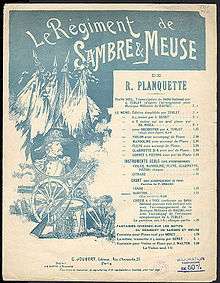Le Régiment de Sambre et Meuse
"Le Régiment de Sambre et Meuse" (English: "Sambre-et-Meuse Regiment") is a French poem and military march by Robert Planquette and Paul Cezano.
| "Le Régiment de Sambre et Meuse" | |
|---|---|
| March by Robert Planquette | |
 Sheet music cover | |
| English | "The Regiment of the Sambre and Meuse" |
| Text | by Paul Cezano |
| Language | French |
| Premiere | |
| Date | March 3, 1870 |
| Location | Paris |
| Performers | Lucien Fugère |
Background
Cezano penned the lyrics to "Le Régiment de Sambre et Meuse" following the French defeat in the Franco-Prussian War, Planquette setting them to music shortly thereafter.[1] Cezano was one of a number of French artists of the period who sought to reconcile the defeat of France with memories of its historic victories, with the song describing the achievement of human immortality through heroic death.[1]
It was first publicly performed by the baritone Lucien Fugère in a Paris cabaret on March 3, 1870.[2] Quickly finding favor as a popular song, it became a part of the music curriculum in schools during the French Third Republic, and was used at other important moments in French history during the late 19th and early 20th centuries.[1] It was performed to accompany Alfred Dreyfus' degradation ceremony of 1895 and, during the First World War, to accompany the execution of traitors, though it later fell out of favor.[1]
Use outside France
Since 1936, the Ohio State University Marching Band has performed Le Régiment de Sambre et Meuse as part of its pregame show during the script Ohio formation.[3][4] It is also a staple of the repertoire of the West Point Band, where it is known by the name French National Defile.[3]
Le Régiment de Sambre et Meuse is often used for marches of the Belgian military schools in Brussels (KMS) and Sint-Truiden (KSOO) because of the historic link of this song with Belgium. Also in the most southern part of The Netherlands, Le Régiment de Sambre et Meuse, is played often, because of the historic link of this region with Belgium.
Le Régiment de Sambre et Meuse is also used for the marchpast piece of the 1st Infantry Regiment Grenadiers Platoon of Chilean Army. And used for the marchpast piece of the Air Force Academy of Bolivia.
It was formerly the regimental march of the Royal 22nd Regiment of the Canadian Army until 1939.[5]
Use in fiction
In Robert Heinlein's Starship Troopers, the character Sergeant Zim leads his soldiers in the singing of "oldies ... like Le Régiment de Sambre et Meuse and Caissons".[6]
Lyrics
| French | English |
|---|---|
|
1er couplet:
Refrain:
|
1st verse:
Chorus:
|
References
- Sweeney, Regina (2001). Singing Our Way to Victory: French Cultural Politics and Music During the Great War. Wesleyan University Press. pp. 1–2. ISBN 0819564737.
- Macy, Laura (2008). The Grove Book of Opera Singers. Oxford University Press. p. 172. ISBN 0195337654.
- Tyler, Don (2016). Music of the First World War. ABC-CLIO. p. 245. ISBN 1440839972.
- Fairman, Jonathan (2004). Script Ohio: 125 Years of the Ohio State University Marching Band. Kappa Kappa Psi. ISBN 0976421305.
- "La Musique du Royal 22e Regiment (Royal 22nd Regiment Band)". Encyclopedia of Music in Canada. Retrieved September 1, 2019.
- Heinlein, Robert (1959). Starship Troopers. Penguin. p. 72.
External links
- Complete lyrics
- Modern interpretations: vocal
- Le Régiment de Sambre et Meuse (The Sambre and Meuse Regiment) on the site of the Fédération Nationale des Combattants Volontaires
- "Le régiment de Sambre et Meuse": Scores at the International Music Score Library Project (IMSLP)
- Le régiment de la musique de l'air "Sambre et Meuse"
| Wikimedia Commons has media related to Le Régiment de Sambre et Meuse. |